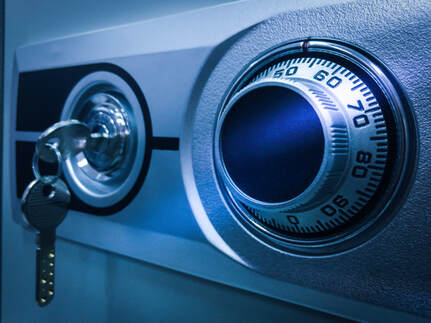 Choosing Between a Safe Deposit Box and Home Safe Deciding the best way to keep valuables safe is often a dilemma for consumers. The following information can help determine if a home safe or a safe deposit box at your local bank is the best option for you. Home Safe
The demand for home safes has spiked recently. Medium-size safes can be purchased for as little as $150 dollars. Inexpensive safes may only weigh between 100 to 150 pounds, which means that one or two not-so-hefty burglars could easily remove it easily from a home. However, even large safes are vulnerable. A 300-pound safe can be opened using crowbars, sledgehammers and other tools found in most garages. If you choose a home safe, buy one that is fire and water-resistant, and place it in an area not prone to flooding and away from flammable items. Anything you do to slow a thief down can cause them to miss or give up on your safe. Place your safe in an area where thieves aren’t likely to search for valuables (e.g., a child’s closet), and bolt it to or anchor it in a concrete floor. Safe Deposit Box On the other hand, a safe deposit box at your local financial institution essentially weighs thousands of pounds and resides inside a financial institution vault behind a 12-inch thick vault door with reinforced concrete and steel walls. In addition, it is protected by a state-of-the-art security system that is monitored 24-hours a day by a bonded and professional security monitoring company. There are several common misconceptions about safe deposit boxes. First, there are no state or federal laws that restrict the storing of cash, coins or precious metals in a safe deposit box. Such laws could never be enforced because box contents are always confidential. No financial institution employee can or should know what's in your box. Although there's no way for a financial institution to know what's in your box, be sure to read your rental agreement because it may prohibit certain items. Second, if an institution fails, safe deposit boxes are secure. In the majority of cases, a troubled financial institution is usually acquired by another bank or credit union. In this case, it’s business as usual. In the event that a failed institution is taken over by regulators, each box renter will be notified that his or her safe deposit box contents needs to be retrieved. If the worst-case scenario happens and the financial institution is permanently closed, a list of contact numbers will be supplied to all box renters. If that happens, simply contact the regulator and make an appointment to remove the contents of the box. It is very unlikely that a safe deposit box’s contents will be seized or impounded by the institution or the regulators. Third, safe deposit box contents are not insured by Federal Deposit Insurance Corporation, National Credit Union Administration or the financial institution. Safe deposit boxes typically come in several sizes ranging from small to large depending on your needs. Annual rental fees run from a few dollars to more than $150 based on box size. These rental fees typically include an elaborate security system and unlimited access to box contents. Neither a home safe--regardless of its size or cost--nor a safe deposit box housed in the most secure vault can always protect against burglaries, terrorism or the ravages of natural or man-made disasters. Hurricane Katrina caused the flooding of vaults and home safes, and the intense heat caused by the World Trade Center attack destroyed many boxes. To avoid water damage from a flood, all items in a home safe or safe deposit box should be sealed in airtight plastic bags or watertight containers. Home safes are certainly convenient for those items you need instant and frequent access to, but for security and peace of mind, you get more bang for your buck with a safe deposit box. This information is provided with the understanding that the association is not engaged in rendering specific legal, accounting, or other professional services. If specific expert assistance is required, the services of a competent, professional person should be sought. Provided as a public service by the Pennsylvania Association of Community Bankers. Comments are closed.
|
AuthorWrite something about yourself. No need to be fancy, just an overview. Archives
December 2017
Categories
All
|
|
Pennsylvania Association of Community Bankers
800 N. 3rd Street, Suite 304 Harrisburg, PA 17102 Phone: (717) 231-7447 [email protected] | sitemap (C) All Rights Reserved Our Privacy Policy Our Copyright Policy |
"To empower community banks to make positive impact within the communities they serve."
|
